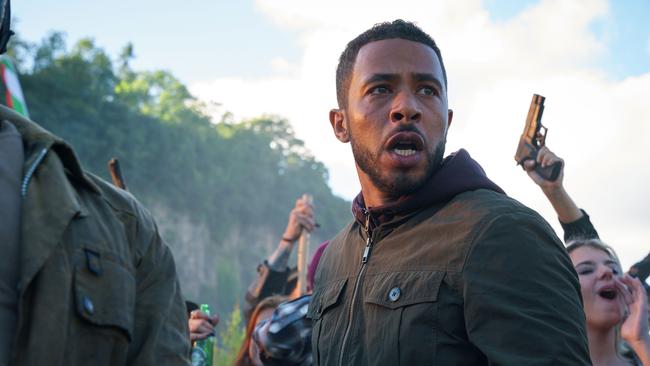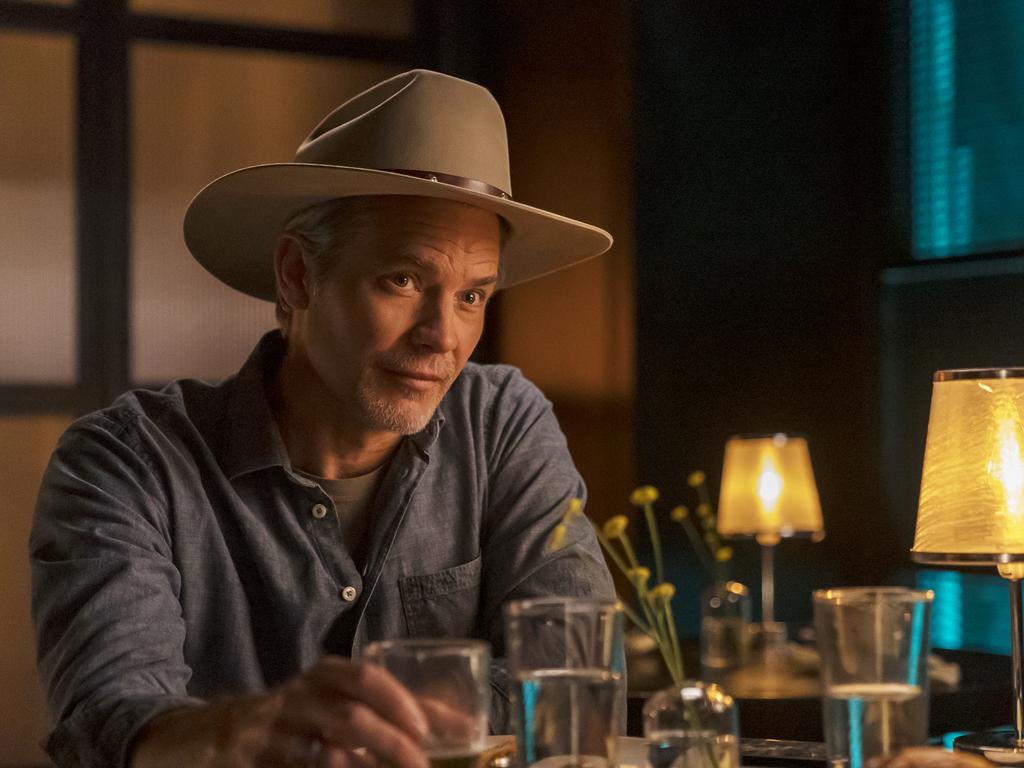BBC’s Wolf an unforgettable thriller
When Jack Caffrey, played by Ukweli Roach, wakes up in his dead brother’s bed he becomes obsessed with finding out what happened all those years ago.

‘If I show, for example, a child being murdered, I do trust my readers to come to the right conclusions without the narrative dictating to them how horrified and bereft they should feel,” the late crime writer Mo Hayder said. “I think it’s quite condescending to make it too heavy handed. The big difficulty with writing like this is being sure I’ve done enough to elicit the emotional response I’m hoping for.”
Wolf, the latest thriller series from the BBC and based on Hayder’s acclaimed Jack Caffery novels, certainly knows how to grab the viewer’s attention. A work of transgressive and unsettling drama, it breaks many of the genre’s cherished conventions. It’s ineffably dark and riveting, and at times weirdly, macabrely comic. And, as was said of Hayder’s books, it will conjure images that might linger and disturb.
Hayder died in 2021 at age 59 after being diagnosed with motor neurone disease. Her work is often compared to the novels of Stephen King, Stuart McBride and Karin Slaughter. They are books readers can hardly easily forget.
Her first novel, Birdman, introduced the troubled policeman Detective Inspector Jack Caffery and his gruesome investigations. Caffrey is a lone wolf cop who simply can’t let go of the figurative scent of blood.
Reviews were mostly enthusiastic, but many critics were repelled by the violence of her writing and what one reviewer called “her almost Jacobean fixation with ‘the skull beneath the skin’, with death as the ever-present shadow sibling of life.”
The influential Kirkus Review called it a “top-notch debut thriller, a deftly plotted assault on the nerves whose only serious weakness is its over indebtedness – for crucial horrendous details – on Thomas Harris’s already seminal The Silence of the Lambs.” The New Yok Times was less kind but certainly fascinated by what reviewer Richard Berstein called Hayder’s straining for non-stop scenes of psychotic lust pandering “to the commercialised fascination with unhinged perversion”.
She claimed that the novel had been written to exorcise her dark obsessions, but it only clarified what she called a “compulsive need to wriggle my toes in life’s gutters”.
It was an instant bestseller and her books have now sold millions of copies. As the crime writer Mark Billingham said in his obituary of Hayder: “The graphic descriptions of violence and its aftermath were not to everyone’s taste, especially those who preferred their fictional murders to happen offstage and their sleuth to be the sort who gathered suspects together in a drawing room.”
The press called her “Britain’s most glamorous crime writer” – the author had won a miss nude beauty pageant in 1982, for a time was a photographic model, and guest starred in episodes of Benny Hill. She said she switched to writing crime after she apparently witnessed three deaths while living and working in Tokyo.
There was a heart attack in a coffee bar, a workman falling to his death and a snakebite. Then there was the murder of a friend and the brutal rape of another. She became fascinated with violence and mortality. “I guess we are all made up of dark and light and if I can exorcise the dark parts of my nature by writing, then it’s probably a good thing.”
This new series is from award-winning Hartswood Films (Sherlock, Dracula) and boutique production house APC Studios (Broken Ties). It was created and written by the accomplished Oslo-based American Megan Gallagher, who received her big break just as Nordic Noir was finding global success with series such as The Bridge, The Killing and Borgen. She created Netflix’s Norwegian noir crime drama Grenseland and Viaplay’s supernatural crime series Seizure.
The series’ director is the accomplished Kristoffer Nyholm. He is best known for that seminal Danish crime drama Forbrydelsen (The Killing) but in recent times was responsible for the highly cinematic British series The Enfield Haunting and Taboo. He also directed episodes of the moody, atmospheric Endeavour. Nyholm is a director easily at home in the newish cinematic world of so-called prestige TV, that hybrid between television and film.
In creating Wolf, Gallagher decided to bring together elements of two different books to form the basis of Wolf, blending Caffrey’s origin story from the first book in the series, Birdman, with the family drama of the final, Wolf. Gallagher liked the project when offered because they are “proper thrillers,” rather than traditional detective-led whodunnits. “Thrillers are set up in a way that you’re waiting for the bad thing to happen, and that’s the fun part,” she told Drama Quartley. “It’s rare that you get crime stories and crime books that really are thrillers.”
Wolf begins with a highly atmospheric dream sequence that instantly provides that sense of threat, dread, and menace crucial to good thrillers. Someone in a hazmat suit drags a body into a field and dances. Then we find Jack Caffrey, played with the right level of intensity by Ukweli Roach, searching a darkened building, moving through it until he discovers children’s toys and suddenly realises he’s locked in.
After he abruptly wakes up at home – it turns out to be his late parent’s house; his bed is his dead brother’s – he looks through the window where he continues to obsessively watch his neighbour Ivan Penderecki (Anthony Webster), whom he fervently believes is responsible for his 10-year-old brother’s death 25 years ago.
Caffrey is a lone wolf cop (“I don’t have friends; I have colleagues” he says), who is newly appointed to London’s murder squad. He is intuitive and sharp-witted but deals not only with the childhood trauma of his brother’s disappearance but a failing relationship with a posh girlfriend, the persistently annoying Veronica (Kezia Burrows). This is complicated in that she might be a recovering cancer patient – or she might be lying. She also can’t understand the depths of his grief, or his obsession with his brother’s bedroom.
A parallel plot emerges, initially mysterious but quickly propulsive. As Jack battles with his obsessions, the wealthy Anchor-Ferrers family: mum Matilda (Juliet Stevenson), her businessman husband Oliver (Owen Teale) and daughter Lucia (Annes Elwy), return to their Welsh home in rural Monmouthshire so Oliver can recuperate from a heart operation. They’re accompanied by Lucia’s dog, Bear, who becomes essential to the plot.
But things go horribly wrong as this story is quickly linked to what was known locally as “The Donkey Pitch Murders”, when the Anchor-Ferrers discover something strung up in the trees in their garden that looks like intestines. Five years earlier, two teenagers were brutally murdered. Their killer was caught and imprisoned. But on the anniversary of the deaths the family is suddenly threatened. The two narratives are quickly linked by the involvement of an enigmatic vagrant living off the grid called the Walking Man.
The only thing that is clear, as the first episode ends, is that somehow the story of the Anchor-Ferrers will gradually build up alongside Caffrey’s search for clues about his brother, and the links between the two storylines will gradually become clear.
It’s superbly directed by Nyholm, who engineers the differing perspectives of guilt, complicity, and menace astutely, with a relish for the pulpish extremes of Gallagher’s adaptation. At times it’s more horror story than thriller.
And although Gallagher has a background in Scandinavian Noir, this is different, she has said, though the similarities are unavoidable.
Billingham summarised Hayder’s approach this way: “As a writer she was unique and fearless, with that rare ability to nudge a reader’s imagination into places that were genuinely terrifying and to conjure images that would linger and continue to disturb, like fragments of a nightmare.”
He might have been talking of Gallagher’s adaptation.
Wolf is streaming on SBS On Demand.






To join the conversation, please log in. Don't have an account? Register
Join the conversation, you are commenting as Logout